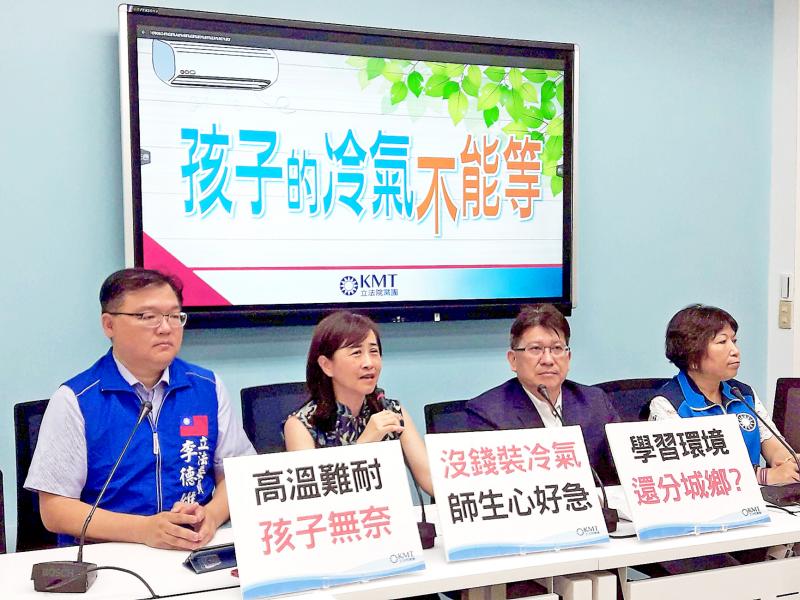The Chinese Nationalist Party (KMT) caucus yesterday urged the government to allocate a part of the budget for the second stage of the Forward-looking Infrastructure Development Program to installing air-conditioners and overhauling electricity systems at elementary and secondary schools, as people are experiencing intense heat across the nation.
The special budget for the second phase of the program totals NT$420 billion (US$14.2 billion), while it would only take a fraction of that amount — about NT$20 billion, a National Development Council estimate showed — to provide all elementary and secondary schools with air-conditioning, the caucus said.
Taipei on Tuesday recorded its second-hottest day in June since 1896, as the temperature soared to 38.4°C, while the apparent temperature was more than 40°C, caucus secretary-general Lin Yi-hua (林奕華) told a news conference at the Legislative Yuan in Taipei.

Photo: CNA
President Tsai Ing-wen (蔡英文), Premier Su Tseng-chang (蘇貞昌) and Minister of Education Pan Wen-chung (潘文忠) should turn off the air-conditioners in their offices for several hours to experience the “appalling” learning environments many students are in, Lin said.
Lawmakers last year held a meeting with parents, school administrators and Ministry of Education officials over the issue of air-conditioning, during which ministry officials said that some schools would have to make do with electric fans, she said.
This showed that the central government was aware that some local governments lack the funds to install air-conditioners at schools, so it should make installing air-conditioners a central government policy, Lin said.
The Cabinet should earmark part of the special budget for the infrastructure program to install air-conditioners at schools nationwide and improve their power systems to ensure safety, she said.
KMT Legislator Lin Szu-ming (林思銘), who represents Hsinchu County, said that some classes in schools have raised enough money from parents to install air-conditioners, while others have not.
This has resulted in “one school, two systems” or, on a broader scale, “one county, two systems,” he said.
The ministry last year used only 66 percent of its budget under the infrastructure program, so it should definitely list air-conditioners as a budgetary item for the program’s second phase, Lin Szu-ming said.
This way, local governments would be able to request funds from the ministry after determining the amount of money needed to install air-conditioners, he said.
“If the government is stingy and does not want to install air conditioners at schools, it can build more prisons later,” KMT Legislator Sandy Yeh (葉毓蘭) said.
With the apparent temperature in Taipei reaching 46°C yesterday morning, air-conditioners should be a basic requirement for schools, she said.
Former Singaporean prime minister Lee Kuan Yew (李光耀) in an interview attributed Singapore’s success to air-conditioners, and Taiwan should likewise see merit in the idea, she added.
“If you must save money, do not save on education; if you must suffer, do not let the children suffer,” KMT Legislator Lee De-wei (李德維) said.
Due to the COVID-19 pandemic, some schools were resigned to leaving classroom windows open to boost ventilation even when they were using air-conditioners, Lee said.
This has caused some schools to be fined for exceeding the electricity cap that the Ministry of Economic Affairs set on them, he said, calling on the education ministry to pay for the fines using its share of the special budget.

Taiwanese can file complaints with the Tourism Administration to report travel agencies if their activities caused termination of a person’s citizenship, Mainland Affairs Council Minister Chiu Chui-cheng (邱垂正) said yesterday, after a podcaster highlighted a case in which a person’s citizenship was canceled for receiving a single-use Chinese passport to enter Russia. The council is aware of incidents in which people who signed up through Chinese travel agencies for tours of Russia were told they could obtain Russian visas and fast-track border clearance, Chiu told reporters on the sidelines of an event in Taipei. However, the travel agencies actually applied

Japanese footwear brand Onitsuka Tiger today issued a public apology and said it has suspended an employee amid allegations that the staff member discriminated against a Vietnamese customer at its Taipei 101 store. Posting on the social media platform Threads yesterday, a user said that an employee at the store said that “those shoes are very expensive” when her friend, who is a migrant worker from Vietnam, asked for assistance. The employee then ignored her until she asked again, to which she replied: "We don't have a size 37." The post had amassed nearly 26,000 likes and 916 comments as of this

New measures aimed at making Taiwan more attractive to foreign professionals came into effect this month, the National Development Council said yesterday. Among the changes, international students at Taiwanese universities would be able to work in Taiwan without a work permit in the two years after they graduate, explainer materials provided by the council said. In addition, foreign nationals who graduated from one of the world’s top 200 universities within the past five years can also apply for a two-year open work permit. Previously, those graduates would have needed to apply for a work permit using point-based criteria or have a Taiwanese company

The Shilin District Prosecutors’ Office yesterday indicted two Taiwanese and issued a wanted notice for Pete Liu (劉作虎), founder of Shenzhen-based smartphone manufacturer OnePlus Technology Co (萬普拉斯科技), for allegedly contravening the Act Governing Relations Between the People of the Taiwan Area and the Mainland Area (臺灣地區與大陸地區人民關係條例) by poaching 70 engineers in Taiwan. Liu allegedly traveled to Taiwan at the end of 2014 and met with a Taiwanese man surnamed Lin (林) to discuss establishing a mobile software research and development (R&D) team in Taiwan, prosecutors said. Without approval from the government, Lin, following Liu’s instructions, recruited more than 70 software